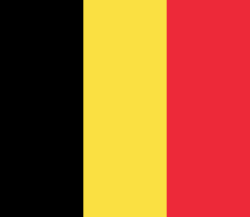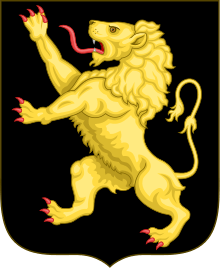Belgian literature
Because Belgium is a multilingual country,[note 1] Belgian literature is divided into two main linguistic branches following the two most prominently spoken languages in the country - Dutch and French. [note 2] German is the third language in Belgium and is spoken by a small community of about 70,000 German-speakers of the German-speaking Community of Belgium bordering on Germany.
| Part of a series on the |
| Culture of Belgium |
|---|
 |
| History |
| People |
| Languages |
| Cuisine |
| Festivals |
| Religion |
| Art |
| Literature |
|
Music and performing arts |
|
Media |
| Sport |
|
Monuments |
|
Some literature also exists in the regional languages of Belgium, with published works in both the Walloon language, which is related to French, and also in various regional Flemish or Dutch-related dialects.
Belgian literature in Dutch
- Hugo Claus
- Louis Paul Boon
- Hendrik Conscience
- Eric de Kuyper
- Guido Gezelle
- Willem Elsschot
- Erwin Mortier
- Tom Lanoye
- Jef Geeraerts
- Marnix Gijsen
- Herman de Coninck
- Cyriel Buysse
- Dimitri Verhulst
- Herman Brusselmans
- Dutch language
- Flemish Literature, which is part of the Dutch Literature
- Flemish Community
See also
- (in Dutch) Lijst van Vlaamse schrijvers (list of Flemish authors)
- "Museum of the Flemish literature" (in Dutch). Het Letterenhuis. Archived from the original on 19 July 2012. Retrieved 11 November 2012.
Belgian literature in French
- Nicolas Ancion
- Charles De Coster
- Michel de Ghelderode
- André-Paul Duchâteau
- Maurice Grevisse
- Georges Simenon
- Alain Le Bussy
- Francis Baudouin
- Suzanne Lilar
- Maurice Maeterlinck
- Thierry Martens
- Pierre Mertens
- Henri Michaux
- Amélie Nothomb
- Jean Ray aka John Flanders for his works in Dutch
- "Centre d'Histoire de la littérature belge en langue française" (in French). www.ulb.ac.be. Archived from the original on 1 March 2012. Retrieved 11 November 2012.
Belgian literature in Walloon
Literature in Walloon has been printed since the 16th century or at least since the beginning of the 17th century.[1] Its golden age was in the 19th century: 'That period saw an efflorescence of Walloon literature, plays and poems primarily, and the founding of many theaters and periodicals.' [2] Yves Quairiaux counted 4800 plays for 1860–1914, published or not.[3] In this period plays were almost the only popular show in Wallonia. But this theater remains popular in present-day Wallonia: Theatre is still flourishing with over 200 non-professional companies playing in the cities and villages of Wallonia for an audience of over 200,000 each year.[4] Jacques Ancion wanted to develop a regular adult audience.[5] This regional literature most commonly deals with local folklore and ancient traditions, the most prominent Walloon author being Arthur Masson.[6][7]
- Charles-Nicolas Simonon (1774-1847): "Li Côparèye" (1822)
- Nicolas Defrecheux (1825-1874): "Lèyîs-m'plorer" (Let me weep, 1854)
- Edward Remouchamps (1836-1900) wrote the vaudeville theater piece "Tatî l'pèriquî" (Gautier, the barber, 1885)
- Salme Dieudonné: the novel "Li Houlot" (The cadet, 1888)
- Willame Georges (1863-1917), sonnets
- François Renkin (1872-1906), stylized prose
- Henri Simon (1856-1939): "Li Mwert di l'abe" (The death of the tree, 1909) and "Li pan dè bon Dieu" (The Bread of the Good Lord, 1914)
- Jules Claskin (1884-1926), poetry
- Laloux Auguste (1908-1976): "Li p'tit Bêrt", written before 1940, published in 1963
- Geo Libbrecht (1891-1976): poetry, "Les cloques / Les cleokes (1964)."
See also
- Belgian comics
- French literature
- Dutch literature
External links
- Hendrik Conscience Heritage Library Antwerp for Flemish and French literature in Belgium
Notes and references
- Notes:
- Dutch, French and German are legally the three official languages in Belgium, see: Belgium, European Union
- And therefore usually discussed under French and Dutch literature
- References:
- In his Anthologie de la littérature wallonne, Mardaga, Liège, 1978, ISBN 2-8021-0024-6 Maurice Piron is speaking (p. 5) about four dialogues printed between 1631 and 1636
- 'Switching Languages', Translingual Writers Reflect on Their Craft, Edited by Steven G. Kellman Lincoln: University of Nebraska Press, 2003, p. 153. ISBN 978-0-8032-2747-7
- Yves Quairiaux, L'image du Flamand en Wallonie, Essai d'analyse sociale et politique (1830-1914), Labor, Bruwxelles, 2006, p. 126. ISBN 2-8040-2174-2
- "The Walloon Language Page" (in Walloon). Retrieved 1 January 2012.
- Joan Gross, Speaking in Other Voices: An Ethnography of Walloon Puppet Theaters. Amsterdam and Philadelphia: John Benjamins Press, 2001, ISBN 1-58811-054-0
- "Biography of Arthur Masson" (in French). Retrieved 11 November 2012.
- "Arthur Masson Museum bibliography" (in French). www.espacemasson.be. Archived from the original on 3 March 2016. Retrieved 11 November 2012.
